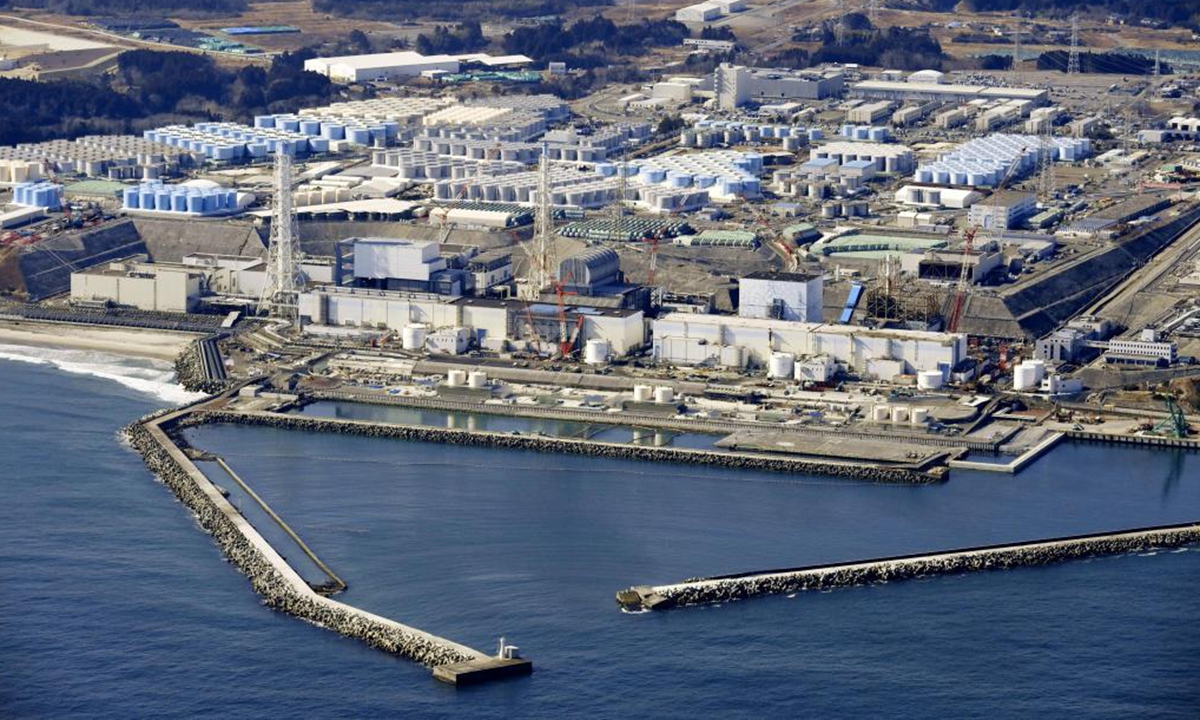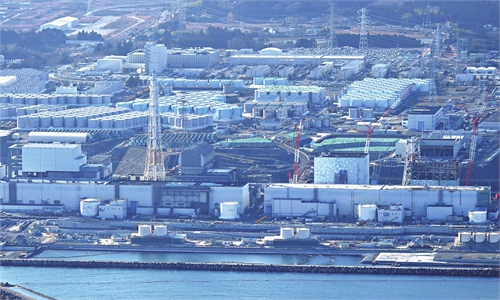
Tanks at the crippled Fukushima nuclear power plant store nuclear-contaminated wastewater. Photo: Xinhua
Editor's Note:As Japan is preparing to dump more than a million tons of radioactive water into the Pacific Ocean in summer this year, Pacific Island Countries are pushing back against Japan's plan. What are the biggest concerns of Pacific Island Countries? Will Japan's decision affect its relations with these affected countries? What do they think about Japan's breach of its promise? Bedi Racule (Racule), president of MISA4thePacific and an anti-nuclear activist from the Marshall Islands, shared her view on these issues with Global Times (GT) reporter Wang Zixuan, as well as their future plans to stop the discharge.
GT: On social media and in interviews, you have expressed opposition against Japan's plan to dump nuclear-contaminated wastewater into ocean. Why do you oppose this plan? What are the biggest concerns of Pacific countries and regions?
Racule: I have come to learn about the Pacific nuclear legacy and how nuclear testing has impacted my people and continues to affect the health and environment of my people. It's a really sad situation. When you combine that with climate change, you see it. It's a huge burden that's very disproportionate because we didn't cause this burden. The dumping of nuclear-contaminated wastewater by Japan would add to this great burden.
The major concern is our health. However, scientists have come out saying that tritium is harmless according to studies, then we move on to the environment and how it will affect our ecosystem, not just the fish that we eat, but the entire biological system. This ecosystem is so important to us, because it plays a big role in our well-being and our livelihoods, the Pacific depends a lot on their fisheries to bring in income. That's one of our major industries.
Also, we are concerned that Japan's action will set a precedent for other countries to dump nuclear waste in the Pacific. It's really scary to think that this will be a long-term plan. We will be almost like Guinea pigs to see how this will turn out or play out, and we would prefer if something did not happen at all.
GT: Fiji, Solomon Islands and some other Pacific countries have taken a stand against Japan's nuclear-contaminated wastewater disposal into the Pacific Ocean. Why did Japan stick to its discharge plan despite domestic and international opposition? Will Japan's decision impact its relations with these affected countries in the near future?
Racule: I'm not sure why Japan would stick to its decision. I think Japan, as a responsible global citizen, should make a choice that doesn't cause harm to other countries. But the nuclear order is one that has been around for a long time, keeping countries in power, funding people who are behind this nuclear industry with great power and great money, other countries in the Global South will pay the price for the choices of the more developed countries. So, I really urge Japan's leaders to consider how this will affect Pacific Island countries, which are also their neighbors. I think it's really important to keep a harmony in our Pacific region.
GT: The Pacific Islands had been a long-time testing ground for the US nuclear program, now Japan is also taking the Pacific as a dumping ground, what does it reflect in these countries' attitude toward the Pacific Ocean and Pacific Island countries?
Racule: I think that the Pacific Ocean is often very undervalued but also overvalued. It's become a kind of colonialism here. People want a piece of the ocean to do what they want with it. But for us in the Pacific, it's a living being, we have to nurture it and protect it so that the ocean can continue to sustain us for eons, people can come and go, but we'll always be here with our ocean.
So, people should understand the value of ocean as a sustainable resource. We see a lot of decisions being made that are now coming to affect our ocean, such as pollution, nuclear waste, mining, etc. With all these things, every country should always consider the health and the well-being of people.
I'm not sure what is happening with the bilateral and multilateral relationships with these countries, but I do think that everyone should treat this issue with utmost respect for one another. It can be a really volatile and sensitive issue when your life is on the line. You will see a lot of passionate activists, they're seeing all of such information about there's not enough reliable data. We just want to be sure. In the past, we were unable to be sure whether nuclear testing or other things were good for our people. Now that we have the scientists who are looking into it our own way, we should be given time to make our own decisions based on what is happening in the information.
GT: Secretary General of the Pacific Islands Forum Henry Puna, said that the Japanese government had pledged to maintain communication with Pacific Island countries on the discharge and provide scientific evidence, but Japan went against its promise. What do you think about Japan's breach of its promise?
Racule: I think every country is free to make their own decisions but should base them on available data, listen to scientists from both sides and put the safety and wellbeing of the people first.
I really have a lot of frustration with what is going on in the world as a young person. Because what I want to see in my home is peace and prosperity. I just want to encourage Japan and any other country who is making a decision that impacts our ocean and peoples to make a good choice that puts the ocean first, because the ocean will continue to take care of us.
Japan has an opportunity here to be a responsible global citizen. They have the opportunity to set a precedent, lead the way for how countries should be respecting one another, and how we in the Pacific can respect the ocean. It is our greatest resource, a big ally in the fight for climate change. We must protect it at all costs, and that will determine our future for our children and our nations. That's true in the Marshall Islands, one of the youth groups that I met with there is collecting water samples and having them tested, so that when Japan dumps its wastewater, they can know how their water is being impacted. To see that happening brings me great sadness, and I know it brings these youths great frustration. There's nothing we can do but prove that the actions are impacting us.
GT: Japan tried to seek G7 endorsement on discharge of nuclear-contaminated wastewater, however, on April 16, G7 ministers denied that they are "welcome" for Japan's discharge. Does this mean that the discharge plan is generally unsupported in the international community? How will this affect Japan's plan?
Racule: I'm gonna say this over and over again, because that's really what I want all countries to consider, including the G7 countries, to put the safety and well-being of people and communities first in whatever decision they are making. I hope that this will allow Japan to consider alternatives to the dump plan. We urge all countries again to consider the safety and well-being of people.
It feels like being trodden down, when you know that you're up against such a big power, you feel like no one's going to listen to you, but I truly think that the world is listening, and the leaders are listening. I have faith in the leaders of my country, and the youths should have faith in the leaders of their country to make good choices. That's why I think young people have a great power and a great role to play in this. With the resilience and veracity of Pacific peoples, including those in China and in South Korea and all of those who are fighting, there is so much power. We are much stronger together, and it's really good for us to communicate and to know that we're not alone, even though it feels inevitable. There are many things throughout history that felt impossible, yet when we look back, it doesn't seem impossible.
GT: Do you and other advocates have other plans in the near future to stop the discharge?
Racule: We really want to share that, you can't put a price on the value of the ocean. People want to know how this will affect our ocean because the biodiversity and fisheries are really important. When you consider the cultural value of the ocean and what it provides to our everyday life in terms of travel and trade, there is really no price that you can put on the ocean. It is just the most sacred resource to our people.
What we plan to do is continue to highlight global awareness through celebration days, like World Oceans Day, bringing people together to remember that we have to commit morally to the ocean, not just financially for development, but how we can be good stewards of our earth, our ocean and our people.

